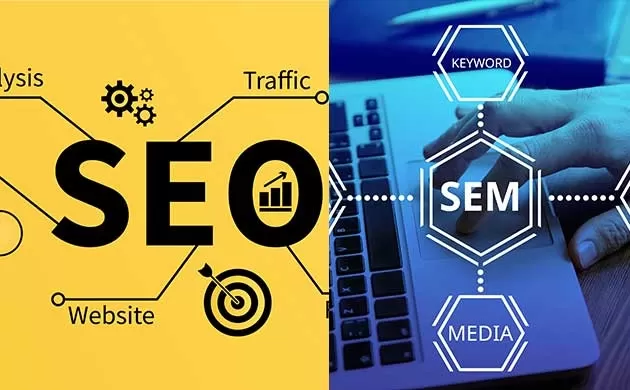What are the key distinctions between search engine optimization and search engine marketing?
What are the Differences between Search Engine Optimization and Search Engine Marketing
You’re in digital marketing, so you’ve probably tried to educate yourself on search marketing but found yourself stuck between SEO and SEM. You could be forgiven for asking, “What are search engine optimization and marketing?” When comparing SEO and SEM, what are the key differences? Exactly how significant are their effects? Also, this.
There’s no need to fret, though. Relax with a mug of coffee and a good book. The purpose of this blog is to answer any questions you may have.
Marketing in the Age of Search
To clear up any confusion, one must first become acquainted with the fundamentals of Search Marketing.
Increasing a website’s traffic and visibility in search engine results pages (SERPs) is the goal of search marketing (SERPs). Keyword research, content optimization, paid AdWords, pay-per-click, social media marketing, and other strategies are part of this category. These techniques allow companies to reach the demographics most likely to buy their wares precisely.
To simplify, search marketing can be broken down into two distinct categories:
By enhancing the site’s visibility in search engine unpaid or “organic,” results, search engine optimization (SEO) strives to increase the site’s visitor count.
Gaining a prominent placement in the paid links alongside organic search results is one goal of search engine marketing (SEM).
Deepen our discussion!
Search engine optimization (SEO) is defined as
Search engine optimization, or SEO, refers to raising a website’s profile and position in unpaid search results.
Search engine optimization, or SEO, increases a website’s visibility in search engine results without directly paying for those results. This method relies on organic factors, such as thorough keyword research, high-quality content, mobile device optimization, etc. In a nutshell, SEO optimization is a slow and steady process.
Here are the four cornerstones of SEO:
In search engine optimization (SEO), “technical” means having a well-tuned site architecture. The site’s accessibility, privacy, and dependability are the main points of emphasis.
In domain rankings, nothing is more crucial than the quality of your content’s search engine optimization. It emphasizes the range, which must meet the audience’s requirements, be of high quality, and be regularly updated.
Search engine optimization (SEO) on individual web pages focuses on providing relevant information to search engines like Google and Bing. Those things include titles, tags, images, and so on.
SEO that doesn’t take place on your site itself focuses on boosting your domain’s authority. You can use it to manage your online profile and get listed in directories and other online resources. In the end, this demonstrates your credibility to search engines, which boosts your search engine rankings.
When asked to define SEM, you might hear “search engine marketing.”
Paid search engine marketing (SEM) is an entirely different strategy than organic SEO regarding where it places your website in search engine results pages (SERPs). That includes promoting their sites through pay-per-click (PPC) advertising networks like Google Adwords. When a user searches for your keyword, your site’s name will appear in the upper sections of the Search Results thanks to these methods, which are all about bidding on keywords.
What do the two methods have in common when comparing SEO and SEM?
Boosts rankings in search engines:
Both organic SEO and paid advertising platforms like Google AdWords aim to do the same thing: boost your site’s visibility and search engine rankings.
Encourage people to watch videos.
Both methods can help you achieve the same goal—increased interaction with and interest in your website.
Investigation of Target Key Words:
You can only find online if you use the right keywords, whether you’re trying to rank organically or paying for visibility. For search engines to determine if your content is relevant to a user’s query, you need to use keywords. Thus, keyword research should be used in any strategy to attract the appropriate audience for search engine optimization and paid advertising.
Constant fine-tuning and improvement:
You can never throw content out there and have it perform well in search engines, regardless of whether you use SEO or SEM. Maintaining high search engine rankings requires consistently updating and improving content.
Which is better, search engine optimization or search engine marketing?
SEM pages, unlike SEO-ranked pages, have an Ad badge:
When using SEM to optimize your content, some of the top search results for your keywords also feature a tiny AdMark. In SEO, however, these marketing symbols do not appear.
To use SEM, you must be willing to pay per click.
You should never have to pay for search engine results page (SERP) rankings if you have done the work to optimize your site for search engines. However, if you have been promoted through SEM, you will have to pay for each click individually.
Unlike SEM, SEO doesn’t guarantee instant results.
We’ve established that SEO is a challenging fix for a high page rank. Getting ranked naturally can take a few months. However, you won’t have to hang around for rankings if you use SEM. AdWords promotion and ongoing keyword bidding will bring you the desired results for your websites.
While SEO can get your content seen, it can be seen by the right people.
With SEM, you can target your content to a specific demographic. Excessive visitors can be filtered according to location, age, or other characteristics. However, SEO is an exception to this rule. Your posts will arise in the feeds of a vast audience automatically.
Search engine marketing (SEM) is more accessible to test than search engine optimization (SEO).
Updating content, testing landing pages, etc., are ongoing tasks. Furthermore, SEM facilitates this action by the users. While it is possible to achieve similar results with search engine optimization (SEO), doing so is not as effortless or dependable as paid advertising platforms like SEM.
In the long run, SEO is more beneficial than SEM.
Your advertisements are the lifeblood of your marketing strategy. As soon as you stop funding your advertisements, they will no longer be seen or heard.
However, search engine optimization is different. It does take time (months), but the effort required to improve your search engine rankings is only made once. Once you’ve mastered SEO and achieved high rankings, you can even outrank the SEM ads.
The CTRs for SEOs are much higher than those for SEM.
When SEO ranks pages, the resulting CTR (click-through rate) is much greater than SEM. However, you should never assume the same if you find yourself toward the bottom of the search engine results page (SERP).
Consultation
Optimization of search engines (SEO) and search engine marketing (SEM) can refer to two different strategies for marketing. SEM aims to increase a website’s visibility in search engine results without directly paying for those results. SEO is a slow and steady process that relies on organic factors such as keyword research, high-quality content, and mobile device optimization. In domain rankings, nothing is more crucial than the quality of your content’s search engine optimization. Organic SEO and paid search engine marketing aim to do the same thing: boost your site’s visibility and search engine rankings.
Both can help you achieve the same goal—increased interaction with and interest in your website. SEM pages, unlike SEO-ranked pages, have an Ad badge: If you have been promoted through SEM, you will have to pay for each click individually. Unlike SEM, SEO doesn’t guarantee instant results for your keywords. Getting ranked naturally can take a few months. Search engine marketing (SEM) is more accessible to test than search engine optimization (SEO).
SEM facilitates the action of the users. Once you’ve mastered SEO and achieved high rankings, you can even outrank the SEM ads. The effort required to improve your search engine rankings is only made once.






Leave a Reply